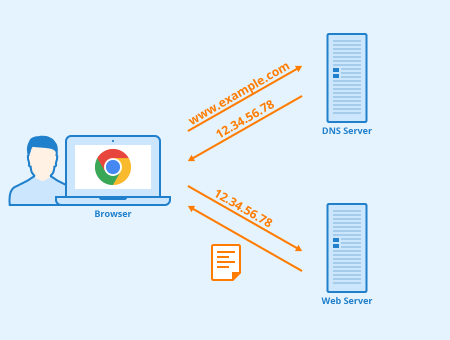DNS Server
Contents
Definition
DNS servers are the foundation of the internet’s domain name system (DNS). They store public IP addresses and other data associated with hostnames. IP addresses are required if you want to access a particular website, device, or network system over the internet. DNS servers are a type of name server.
How does a DNS server work?

Domain names, such as google.com, are easy to remember for humans but less suitable for communication between computers in a network. To make sure that computers and other devices can communicate with each other via the internet or other networks, each device is assigned its own unique IP address. Similar to long phone numbers, IP addresses are difficult to remember for human users. The domain name system (DNS) combines the requirements of humans and computers by enabling a connection, for example to a website, without users having to know the corresponding IP-address. DNS servers play an important role here.
DNS servers translate domain names, such as google.com, into IP addresses. During this resolution process, the DNS records on the server are searched and, if available, the domain name dataset is returned. If the IP address cannot be found on this DNS server, the query is sent to other DNS servers until the data for the respective domain is retrieved.
When you enter a URL into your browser, it starts searching for the corresponding IP-address in your computer's DNS cache. If it finds no information there, the request will be redirected until the IP address will be identified. Thereby it passes the local DNS-Server (usually your internet router), the ISP’s DNS-Server, and the root name server, which is accountable for the respective Top Level Domain (TLD). If there is still no information found, the request will be sent to the Network Information Center (NIC) responsible for the zone. In the case of the TLD “.com”, this is Verisign.
The NIC’s server will send the address of the zone’s authoritative nameserver to the ISP. The ISP will then ask this authoritative server for the IP, and send the information through your router back to your browser. That way the website can be accessed.
If no IP address can be found, an error message is returned. The browser then indicates that the website could not be found or may not exist.
The information provided by authoritative name servers is binding and trustworthy for other servers. In contrast to that, your router or the ISP's servers are non-authoritative. In order to answer repeated queries for the same domain more quickly, the information is temporarily stored in the DNS server’s cache for a set period of time. This period is called “time to live”, abbreviated TTL. Depending on the server configuration, the TTL can vary between a few minutes and several days.
DNS server requirements
DNS servers typically do not verify if received information and data are accurate or from a legitimate source. This is because the domain name system still functions the way it did in the early days of the internet. At that time, only universities and research centers used this system, so there was no reason to believe that anyone would spread fake DNS information. Today, hackers use this lack of verification to infiltrate fake data, obtain confidential information, or redirect users to other servers using methods such as DNS spoofing, cache poisoning, or man-in-the-middle attacks. For this reason, the security requirements for DNS servers have increased significantly.
Protective measures such as DNSSEC (Domain Name System Security Extensions) can increase the security of DNS servers. Similar to SSL/TLS, these extensions use encryption with public keys. Furthermore, DNS based authentication of named entities, abbreviated DANE, offers a collection of protocols for the secure authentication of users.
The relevance of DNS servers for SEO and online marketing
The resolution of an IP address always takes some time and therefore affects the load time of a website. Usually, this process is completed in fractions of a second. If there is a delay, however, this results in longer load times and therefore often higher bounce rates, as user experience is impaired. Since bounce rate is an important criterion for your website’s usability and can affect your rankings, you want to avoid this. To do so, you can use Google Search Console to detect possible errors in name resolution and take appropriate action to correct them.
Related links
Similar articles
| About the author |
 |